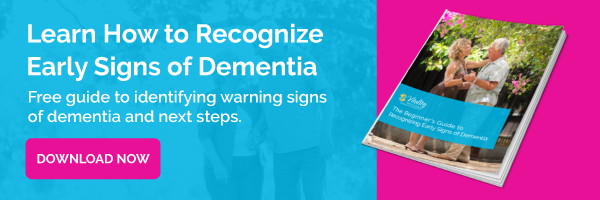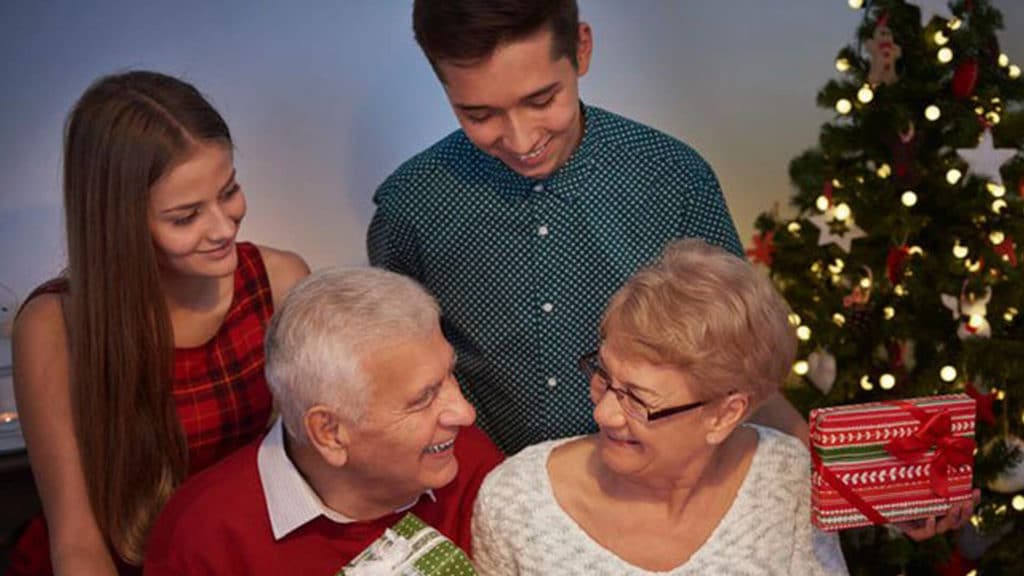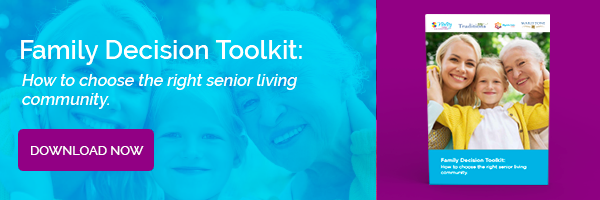Making the holiday season meaningful and bright for your family when a loved one has dementia might feel a little daunting. The disease can create many challenges that can make a change in schedule more difficult. The key to planning for a happy holiday is to focus on what your loved one can do rather than on the losses created by dementia.
Creating Meaningful Holidays for Adults with Dementia
From holiday decorations to family celebrations, planning is the key to enjoying a successful season when a loved one has Alzheimer’s. Here are a few tips to help you plan this year.
Download The Beginner’s Guide to Recognizing Early Signs of Dementia
Holiday Decorations and Alzheimer’s
Start by taking a good look at your holiday décor. Is there anything that might present a risk to a senior with memory impairment?
- Fall Risk: Moving furniture around, running extension cords to and from holiday décor, and generally changing your home environment can put a senior with dementia at risk for a fall. Try to minimize the disruptions and keep the rooms the senior typically uses most often the same.
- Avoid Disorienting Lights: Try to avoid using holiday decorations that have flashing, twinkling, or blinking lights. These can be disorienting and confusing for someone with Alzheimer’s disease. Instead, use lights that remain steadily lit.
- Artificial Candle Flames: Candles are a part of many faith-based holiday celebrations. But an open flame can be dangerous for someone whose judgment is impaired by Alzheimer’s. Stick with battery-operated candles that have an artificial flame. If you do opt for real candles, keep matches and lighters locked away.
Celebrating the Season Together
When it comes to planning family gatherings, here are a few things to keep in mind:
- Consider the Time: Schedule holiday celebrations for the time of day your loved one generally feels their best. For some adults with Alzheimer’s, the early evening hours can be tough. Those who suffer from “sundowning” might be at their worst during what is traditionally considered the cocktail hour. It might be better to plan a brunch or lunch instead.
- Involve the Senior: In years past, your senior loved one likely played a key role in hosting holiday gatherings. So try to involve them in any way you can this year. Some tasks a senior with dementia might be able to help with are washing vegetables, setting the table, mixing up cookie dough, and filling candy dishes.
- Quiet Time: Noisy, busy gatherings can trigger anxiety and agitation for someone with dementia. Have their bedroom or another quiet space prepared for them to retreat to if the party gets to be too much. Play soft music and have some of their favorite magazines or craft projects ready for them to engage in.
Holiday Gifts for an Adult with Dementia
If you are looking for gift ideas for a loved one with dementia, we have a few suggestions:
- Sensory Stimulation: Scented lotion made with organic ingredients makes a great gift. Scents that can be especially soothing include lavender, sage, rosemary, and peppermint.
- Practical Gifts: While they might not seem very exciting, practical holiday gifts should also be considered. A jogging suit that is easy to pull on and off, CDs with nature sounds, comfortable pajamas, and a pair of slippers with non-skid soles are all good gifts for an adult with dementia.
- For the Birds: Bird houses, feeders, and food also make great holiday gifts. Studies show that bird watching has a calming effect on people with Alzheimer’s disease and similar forms of dementia.
Recognizing the Early Signs of Dementia
Do you suspect a senior you love might be in the early stages of dementia? Sometimes the symptoms of the disease can mimic other illnesses, like an infection or a thyroid problem. Our Guide to Recognizing the Early Signs of Dementia might be helpful in telling the difference.
The guide can help you understand more about dementia, learn to identify the symptoms, and review care options you might want to consider if your family member needs help. Download it today and share it with others who are involved in your senior loved one’s care.




